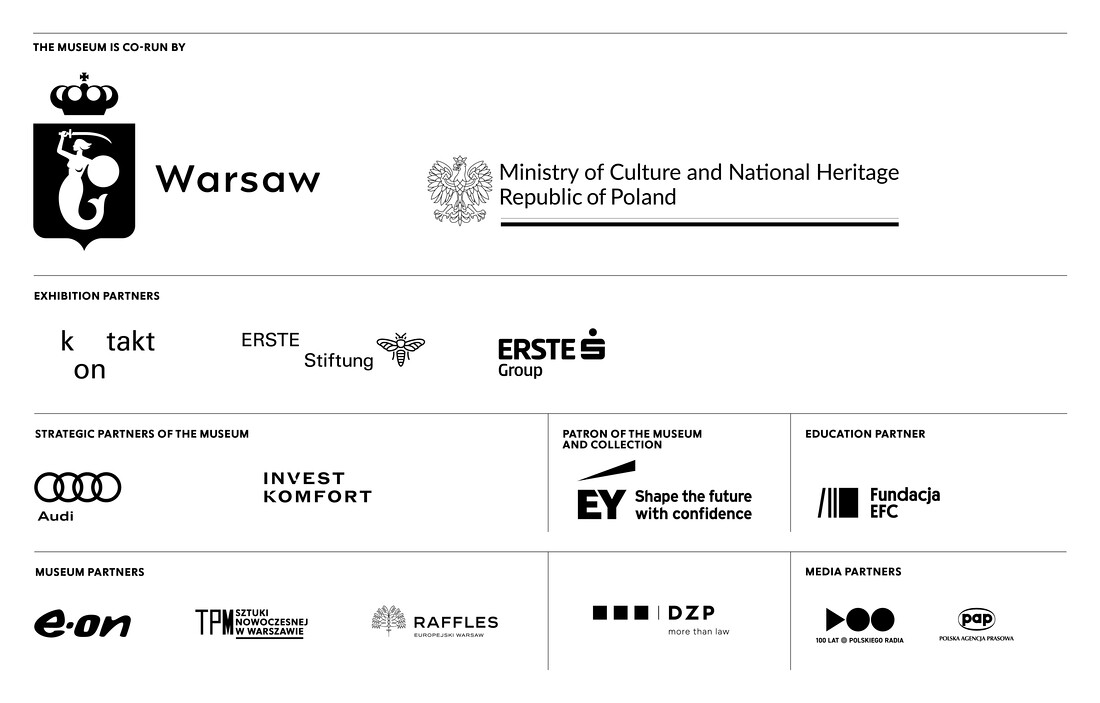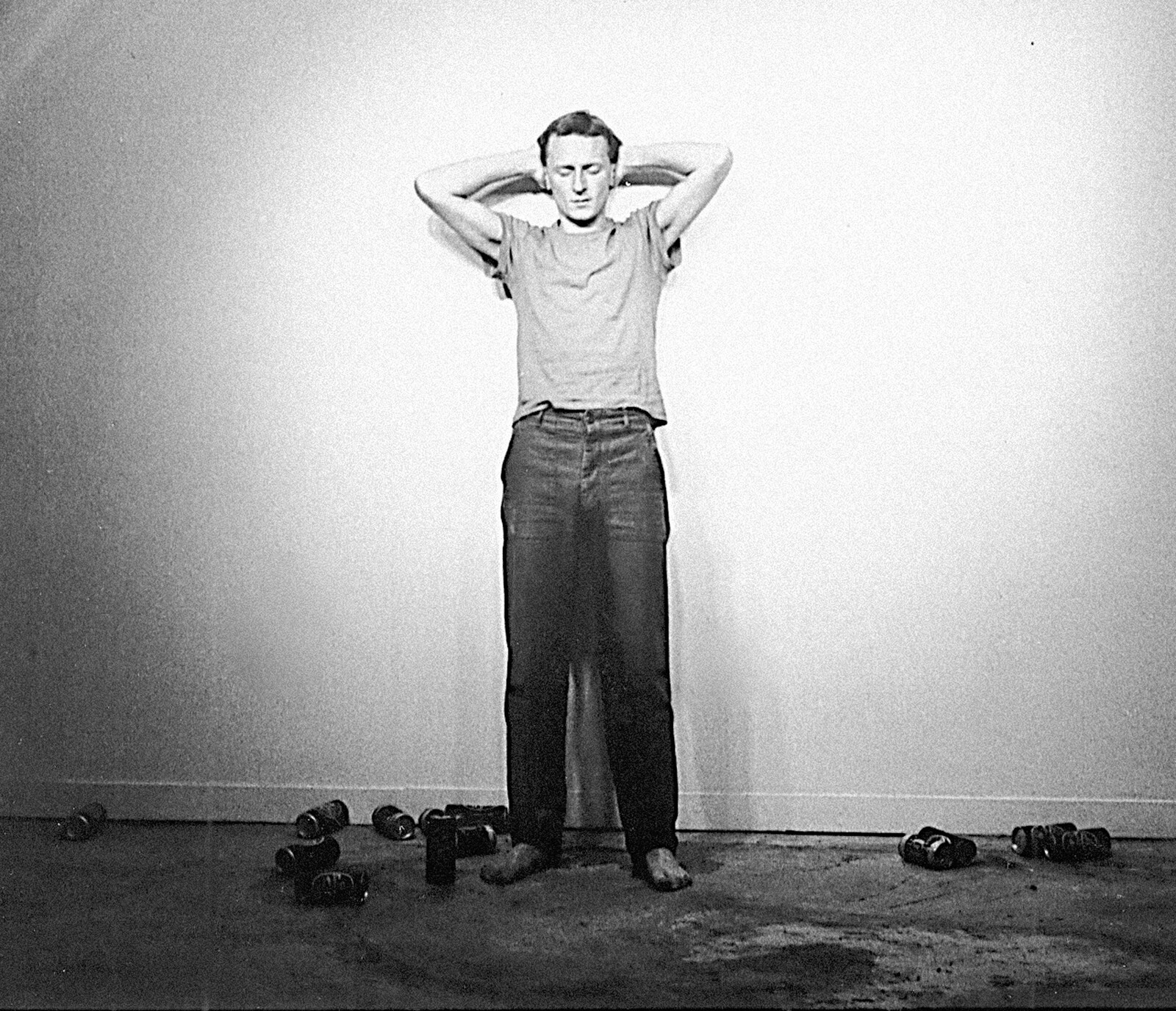May 10–June 8, 2025
Marszalkowska 103
00–110 Warsaw
Poland
Score by Pierre Bal-Blanc.
The Cynics Republic—Plac Defilad is an exhibition featuring dematerialized artworks (performances, protocols, films, sound pieces) from the collections of the Museum of Modern Art in Warsaw and Kontakt Collection in Vienna.
The Cynics Republic—Plac Defilad provides an alternative vision of the history of performance art. The exhibition aims to offer a different historical framework for performative practices. Its starting point is the hypothesis that performance art—or at least the performative stance—has existed since antiquity and was especially influenced by one school of thought, namely Cynicism.
The ancient philosophy of Cynicism, with its most famous proponents Diogenes (c. 412–323 BC) and Hipparchia of Maroneia (c. 350–after 280 BC) maintained that people should live in harmony with nature, reject social categories in favor of imitating animals, shun material possessions, and strive for self-sufficiency (autarky). The philosophy was transmitted not so much through concepts as through gestures. It involved public attitudes, relating to others, words in action. This exhibition seeks to bring such philosophical ideas into dialogue with the notion of performance. All the works on show can be productively considered through the instructions left to us by the Cynics.
The five-week exhibition is divided into five themes that relate to the philosophy of the Cynics.
–Dishonor: a critical alternative to competitiveness
–Shamelessness: anticipating a state of nature
–Destitution: autarky, an ethics of animality
–Ordeal: work freed from its negative, stigmatizing value
–Disruption: an experimental method for the present
The vertical exhibition features performances, protocols, films, sound pieces from the collections of the Museum of Modern Art in Warsaw and Kontakt in Vienna. The Cynics Republic proposes to approach the resources of the collections from the perspective of a repertoire of immemorial gestures. The installation rising inside the monumental staircase invites visitors to explore the pieces by going up or down, which transforms their own movement into a performative act.
The films are visible as well as online on the web site of the Kontakt Video Klub.
Explore the full exhibition schedule
Vertical exhibition
Performance program
Video klub
Cinema program
Artists
Milan Adamčiak, Akademia Ruchu, Tomasz Armada, Artjom Astrov, Cezary Bodzianowski, Geta Brătescu, Stuart Brisley, Agnieszka Brzeżańska, Victor Burgin, Ernst Caramelle, Attila Csernik, Josef Dabernig, Anna Daučíková, Ješa Denegri, Stano Filko by Daniel Grúň, Constantin Flondor, Elisabeth Flunger, Marcus Geiger, Manuel Gorkiewicz, Tomislav Gotovac, Justyna Górowska, Ion Grigorescu, Friedl vom Gröller, Gržinić/Šmid, Sanja Iveković, Robert Jarosz, Jeff Wall Production, Anna Jermolaewa, Michaela Kisling, Július Koller, Jacques de Koning, Milena Korolczuk, Zofia Kulik, Romuald Kutera, Norbert Lacko, Yuri Leiderman, Iwona Lemke-Konart, Tomasz Machciński, Piotr Majdrowicz, Yarema Malashchuk & Roman Khimei, Joanna Malinowska, Krzysztof Maniak, Jolanta Marcolla, Vlado Martek, Dalibor Martinis, Mara Mattuschka, Dóra Maurer, Nenad Milošević, Efthimios Moschopoulos, Teresa Murak, Paul Neagu, OHO, Anna Okrasko, Zbigniew Olkiewicz, Roman Ondak, Franciszek Orłowski, Adrian Paci, Ewa Partum, Gela Patashuri/Ei Arakawa/Sergei Tcherepnin, Manuel Pelmuş, Friederike Pezold, Philipp Quehenberger, Karol Radziszewski, R.E.P. Group, Marek Rogulski, Adam Rzepecki, Mateusz Sadowski, Georgia Sagri, Hans (Ashley) Scheirl, Hans Scheugl, Tomasz Sikorski, Konrad Smoleński, Zdzisław Sosnowski, Cally Spooner, Roman Stańczak, Pamelia Stickney, Mladen Stilinović, Waldemar Tatarczuk, Sergei Tcherepnin, Anton Skaaning Thomsen, Slaven Tolj, Maciej Toporowicz, Jelena Vesić, Clemens von Wedemeyer, Lois Weinberger, Piotr Wyrzykowski, Anna Zaradny, Grzegorz Zgraja, Želimir Žilnik, Artur Żmijewski
Partner of the exhibition, Kontack Collection
Kontakt was set up in 2004 as a non-profit art association devoted to artistic developments in Central, Eastern and Southeastern Europe that had not yet been adequately anchored in art history. With its name, the collection pays tribute to artist Július Koller, who started creating his series of works KONTAKT (Antihappening) in the 1960s. His search for new perspectives and alternative ways of acting has inspired Kontakt to take its 20th anniversary as a chance to raise questions about future artistic and institutional scenarios, relating to, and focusing on, the dematerialized works that make up a large share of its holdings. Therefore this exhibition will see none of Kontakt’s artworks travel to Warsaw physically. Instead, it will feature artistic concepts and ideas immortalized in films, sound works, performances and manifestos.
Kontakt will dialogue with the MSN Warsaw collection. This project will not require any tangible artworks. Works from the collections, such as concepts, ideas, and performances documented on paper or in film or photographic form, are only taken as instructions for performances and sound works on site.

